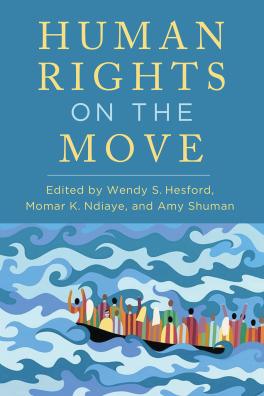
Project Spotlight
On Possibility: Social Change and the Arts + Humanities

In June of 2024, OSU Press released the first volume of its collaborative series, On Possibility: Social Change and the Arts + Humanities. This series, co-edited by the Global Arts + Humanities Discovery Theme and Wexner Center for the Arts, advances cross-disciplinary collaborations that draw on humanistic and creative forms of inquiry, opening new understandings of the differential impact of societal challenges and providing new opportunities to address these differences. Each volume of the new series will align with the annual theme of GAHDT’s signature Society of Fellows program.
The Society of Fellows Program brings scholars, artists and activists together to share research and creative productions around an annual cross-disciplinary theme. Volume one of On Possibility aligns with the thematic of “Human Rights Pasts and Futures,” which centered on issues like global migration, mass incarceration, structural violence and environmental degradation, and it interrogated exclusive and violent claims to the category of the human. As a collective of artists, activists and scholars, GAHDT engaged in dialogue about human rights spheres of influence, the power of testimonial genres, challenges of intercultural documentation and translation and global-local interdependencies.
Many contributors to volume one of On Possibility were among the Society of Fellows inaugural cohort, including two of the three coeditors: Amy Shuman and Wendy S. Hesford. The third editor, Momar Ndiaye (Dance), has been engaged with the Society of Fellows program since he joined Ohio State through a GAHDT cluster hire in global migration and im/mobility. Among the contributors are seven Ohio State faculty: Victor M. Espinosa (Sociology-Newark campus), Guisela Latorre (Women’s, Gender and Sexuality Studies), Elaine Richardson (Teaching and Learning), Tiyi M. Morris (African and African American Studies-Newark campus), Mary E. Thomas (Women’s, Gender and Sexuality Studies), Paloma Martinez-Cruz (Spanish and Portuguese) and Jennifer Suchland (Slavic and East European Languages and Culture, and Women’s, Gender and Sexuality Studies).
On Possibility marks an important dimension of GAHDT’s research impact through its investment in cross-disciplinary collaborations that amplify the transformative power of arts and humanities to drive social change.
Aligned with critical human rights studies and interdisciplinary arts and humanities perspectives, the volume engages broad issues, such as how to reconcile human rights fundamental paradoxes — including its long history of exclusive universalism — and imagine an ethics of collective responsibility. For example, in their piece “Contemporary Art Practices and the Human Right to Global Mobility,” Víctor M. Espinosa and Cristian Pineda address the human rights crisis faced by undocumented migrants and asylum seekers and illustrate the potential for migrants to communicate their struggles and claim their right to mobility through participatory art projects. In “Border Embodiments and Ethical Arts Practices,” Guisela Latorre similarly contemplates the impact of border art in drawing attention to human rights violations against immigrants and practices of imagining more life affirming policies and social relations:
“Border spaces continue to be sites of violence and human rights abuses but also spaces of resourcefulness, resilience, and, above all, creativity. […] At the core of this [border art] work are profound explorations of the body and unwavering ethical commitments to communal and collective care. Their impact on the future of human rights conversations rests […] on their insistence that Self/Other binaries often justify assaults on human rights. [Border artists] willingness to put their own bodies on the line is a courageous act of rebellion against a system that dehumanizes immigrants.” (Guisela Latorre)
Human Rights on the Move suggests that policies alone, as important as they are, are insufficient to respond to human rights violations. In addition, to understand how we might confront persecution in its many forms, contributors argue that we need to pay closer attention to the varied forms of interdependence and relationality — ways that people create public spaces and navigate across the many constraints designed to control them and keep them in place.
The approaches to human rights in this wide-ranging collection are also “on the move,” emphasizing a nimble, cross-disciplinary approach that considers the intersection of politics, culture and the arts. Thus, the impact of Human Rights on the Move lies not only in its contribution to scholarship in human rights studies but also in its invitation to readers to reimagine human rights at these intersections.
Praise for Human Rights on the Move
“Human Rights on the Move reinvigorates discourses and practices of human rights by expanding their reach. With contributors from academic, activist, and performative arenas, the collection offers dynamic conversations about how human rights, despite their paradoxes, shape a ‘living practice’ of advocacy and possible interdependence.” —Alexandra S. Moore, author of Vulnerability and Security in Human Rights Literature and Visual Culture
“Neither universal nor particular, the practice of human rights offered in this collection centers the relational and interdependent emergence of linked transnational struggle. By engaging humanness as a moving target, always in contestation, the contributors open human rights’ decolonial potential, making this book a must-read.” —Julietta Hua, author of Trafficking Women’s Human Rights
Series editors
- WENDY S. HESFORD Faculty Director of the Global Arts + Humanities Discovery Theme, Professor of English and Ohio Eminent Scholar
- PUJA BATRA-WELLS Associate Director, Global Arts + Humanities Discovery Theme
- DIONNE CUSTER EDWARDS Director of Learning and Public Practice, Wexner Center for the Arts
- KELLY KIVLAND Chief Curator and Director of Exhibitions, Wexner Center for the Arts
Purchase Human Rights on the Move
This book is available from OSU Press as a hardcover ($99.95), paperback ($34.95) and E-Book ($34.95)
